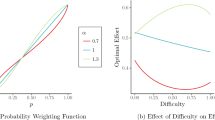Abstract
According to the principle of accountability a person’s fair allocation takes into account the input-relevant variables she can influence, like effort, but not the variables she cannot influence, like luck. We study redistribution behavior in a real effort-task experiment, where luck influences production in three versions that differ in their effort-relatedness: luck comes either as wage luck, endowment luck or payment luck. We confirm that in a base treatment, i.e., in absence of luck, subjects base their allocation decisions largely on effort. When luck is present behavior changes. While we find that redistribution behavior of high performers in the real effort-task is affected by wage luck, we find that endowment luck affects mostly redistribution behavior of low performers. Furthermore, when introducing payment luck, i.e., redistribution of certain versus probabilistic payments, we find that allocations are more selfish for probabilistic payments.
Similar content being viewed by others
References
Andreoni J, Bernheim DB (2009) Social Image and the 50–50 norm: a theoretical and experimental analysis of audience effects. Econometrica 77: 1607–1636
Becker A, Miller LM (2009) Promoting justice by treating people unequally: an experimental study. Exp Econ 12: 437–449
Bicchieri C (2006) The grammar of society: the nature and dynamics of social norms. Cambridge University Press, Cambridge
Bolton GE, Brandts J, Ockenfels A (2005) Fair procedures: evidence from games involving lotteries. Econ J 115: 1054–1076
Bossert W (1995) Redistribution mechanisms based on individual characteristics. Math Soc Sci 29: 1–17
Bossert W, Fleurbaey M (1996) Redistribution and compensation. Soc Choice Welf 13: 343–355
Cappelen AW, Tungodden B (2009) Rewarding effort. Econ Theory 39: 425–441
Cappelen AW, Hole AD, Sorensen EO, Tungodden B (2007) The pluralism of fairness ideals: an experimental approach. Am Econ Rev 97: 818–827
Conte A, Moffat P (2010) The economic modelling of social preferences. Jena Economic Research Papers 2010-42
Dana J, Weber RA, Kuang JX (2007) Exploiting moral wiggle room: experiments demonstrating an illusory preference for fairness. Econ Theory 33: 67–80
Dohmen T, Falk A, Huffman D, Sunde U, Schupp J, Wagner GG (2012) Individual risk attitudes: new evidence from a large, representative, experimentally-validated survey. J Eur Econ Assoc (forthcoming)
Dworkin R (1981) What is equality? Part 2: equality of resources. Philos Public Aff 10: 283–345
Fischbacher U (2007) Zurich toolbox for readymade economic experiments. Exp Econ 10: 171–178
Fleurbaey M (1994) On fair compensation. Theory Decis 36: 277–307
Fleurbaey M (1995) The requisites of equal opportunity, In: Barnett WA, Moulin H, Salles M, Schofield N (eds) Social choice, welfare, and ethics. Cambridge University Press, Cambridge
Fleurbaey M, Maniquet F (1999) Cooperative production with unequal skills: the solidarity approach to compensation. Soc Choice Welf 16: 569–583
Frohlich N, Oppenheimer JA, Kurki A (2004) Modeling other-regarding preferences and an experimental test. Public Choice 119: 91–117
Gaechter S, Riedl A (2006) Dividing justly in bargaining problems with claims. Soc Choice Welf 27: 571–594
Greiner B (2004) An online recruitment system for economic experiments. In: Kremer K, Macho V (eds) Forschung und wissenschaftliches Rechnen. GWDG Bericht 63. Ges. fuer Wiss. Datenverarbeitung, Goettingen, pp 79–93
Gueth W (1994) Distributive justice: a behavioral theory and empirical evidence. In: Brandstaetter H, Gueth W (eds) Essays on economic psychology. Springer, Berlin, pp 153–175
Heider F (1958) The psychology of interpersonal relations. Wiley, New York
Homans GC (1958) Social behavior as exchange. Am J Sociol 63: 597–606
Homans GC (1961) Social behavior: its elemental forms. Harcourt, Brace & World, New York
Johansson-Stenman O, Konow J (2010) Fair air: distributive justice and environmental economics. Environ Resour Econ 46: 147–166
Konow J (1996) A positive theory of economic fairness. J Econ Behav Organ 31: 13–35
Konow J (2000) Fair shares and cognitive dissonance in allocation decisions. Am Econ Rev 90: 1072–91
Krawczyk M, Le Lec F (2010) ‘Give me a chance!’ An experiment in social decisions under risk. Exp Econ 13: 500–511
Rauhut H, Winter F (2010) A sociological perspective on measuring social norms by means of strategy method experiments. Soc Sci Res 39: 1181–1194
Roemer JE (1993) A pragmatic theory of responsibility for the egalitarian planner. Philos Public Aff 22: 146–166
Roemer JE (1995) On a mechanism implementing egalitarianism with responsibility. In: Farina F, Hahn F, Vannucci S (eds) Ethics, rationality, and economic behavior. Oxford University Press, Oxford
Roth AE, Malouf MWK (1979) Game-theoretic models and the role of information in bargaining. Psychol Rev 86: 574–94
Rotter JB (1966) Generalized expectancies for internal versus external control of reinforcement. Psychol Monogr 80: 609
Schmelz K (2010) E-nstructions: using electronic instructions in laboratory experiments. Working paper
Selten R (1978) The equity principle in economic behavior. In: Gottinger H, Leinfellner W (eds) Decision theory and social ethics, issues in social choice. D. Reidel, Dordrecht, pp 289–301
Sen AK (1985) Commodities and capabilities. North-Holland, Amsterdam
Author information
Authors and Affiliations
Corresponding author
Rights and permissions
About this article
Cite this article
Becker, A. Accountability and the fairness bias: the effects of effort vs. luck. Soc Choice Welf 41, 685–699 (2013). https://doi.org/10.1007/s00355-012-0702-2
Received:
Accepted:
Published:
Issue Date:
DOI: https://doi.org/10.1007/s00355-012-0702-2




